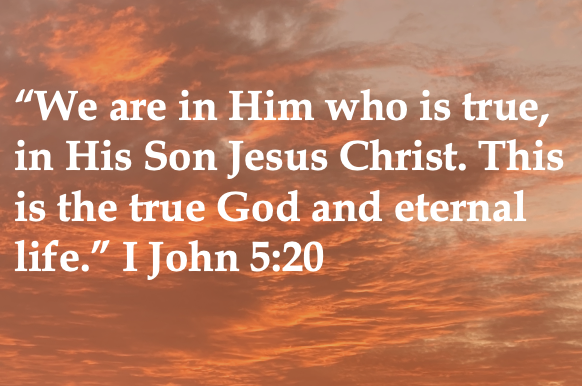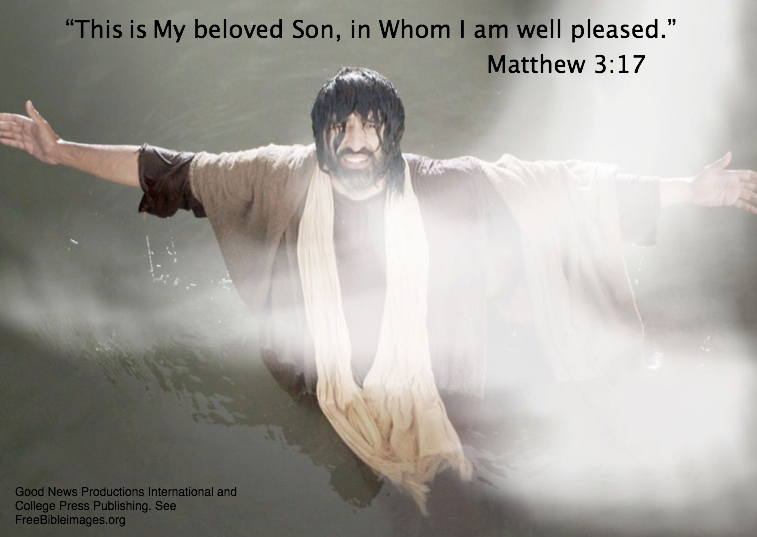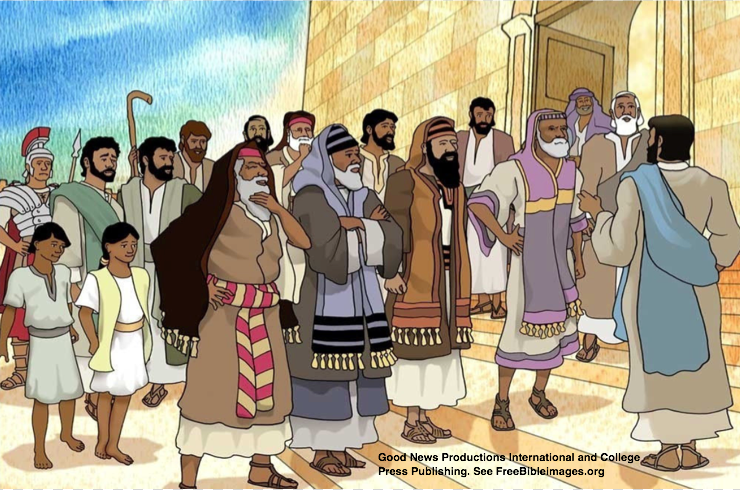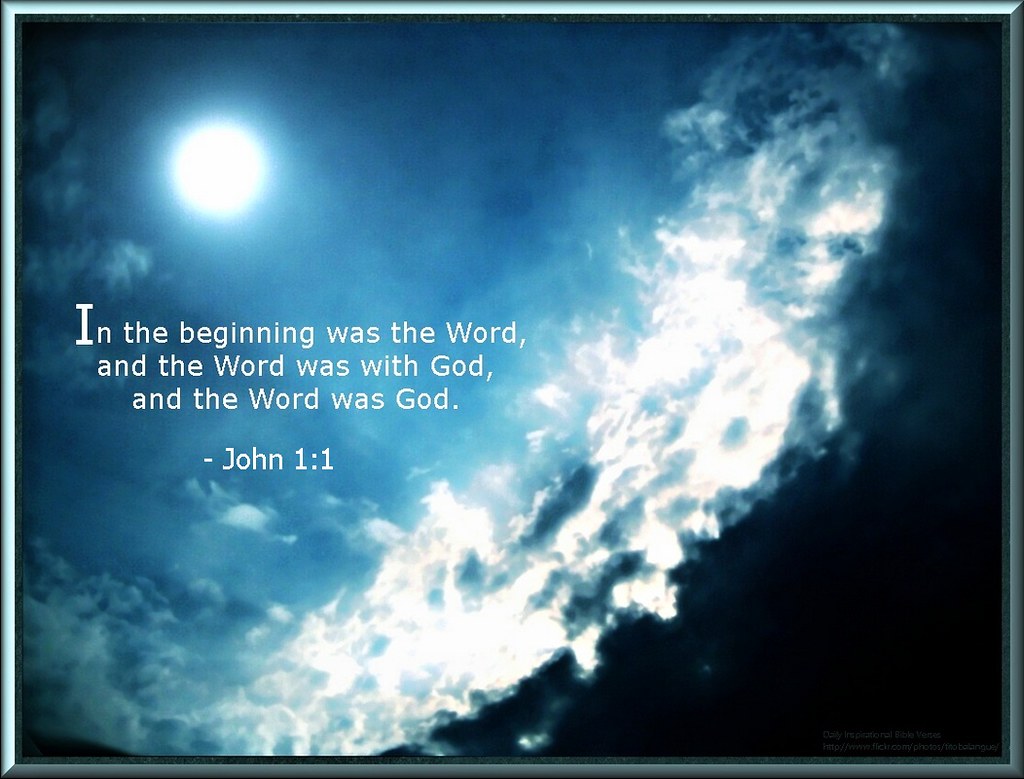“And we know that the Son of God has come and has given us an understanding, that we may know Him who is true; and we are in Him who is true, in His Son Jesus Christ. This is the true God and eternal life.” I John 5:20.
This will be our last lesson on the book of I John. As we have stated several times before, this book is about fellowship with God (1:3-4). Being in fellowship with God depends on walking in the light as He is in the light (1:7), confessing our sins (1:9), keeping God’s commandments (2:3-5; 3:24), loving one another (2:9-11; 3:11-23; 4:7-5:3), hating the world (2:15-17), acknowledging Jesus is God’s Son (2:23; 4:2-3, 4:15), practicing righteousness (2:29-3:10), listening to and obeying apostolic teaching (4:6), and avoiding idolatry (5:21).
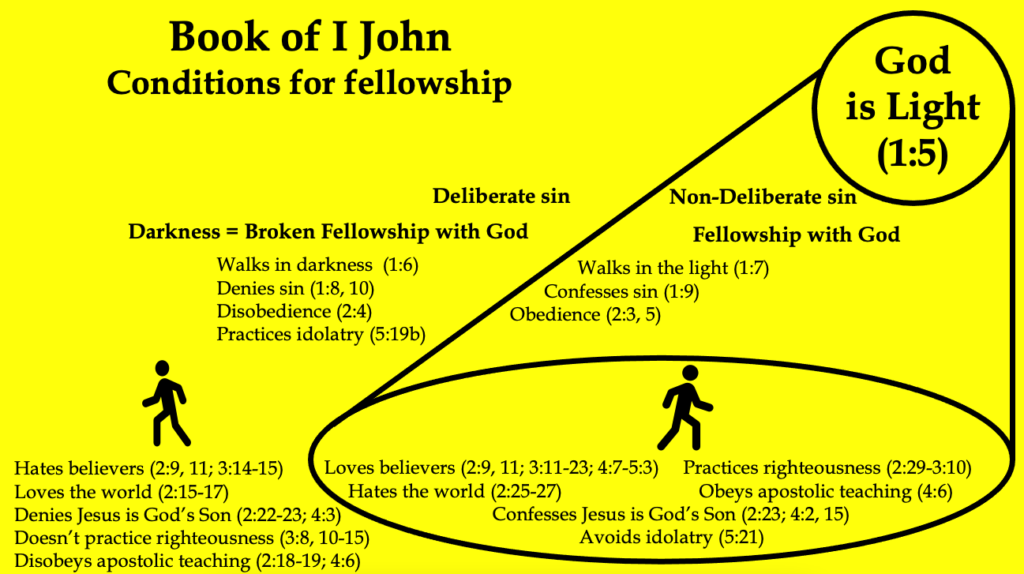
As the apostle John concludes his letter, he is seeking to encourage his Christian readers (2:12-14; 5:13) who may be moving deeper into darkness along the path of sin or they may know of other Christians who are, and therefore, may be in danger of a premature physical death (5:16-17; cf. Acts 5:5-10; I Cor. 3:16-17; 5:5; 11:30). John already presented two unchanging certainties in 5:18-19 beginning with the phrase “we know that…” (oidamen hoti). He wants his readers to know that no matter how far down into darkness a Christian brother or sister has traveled, they are still God’s child at the core of their being because His sinless seed remains in them (5:18; cf. 3:9) and he or she is on God’s side whether they consciously sense that or not, and will therefore feel like a foreigner in this Satanically controlled world (5:19; 2:16-17). 1
We are now ready to look at the third encouragement from the apostle in 5:20. This is one of the clearest verses in the Bible concerning the deity of Jesus Christ. “And we know that the Son of God has come and has given us an understanding, that we may know Him who is true; and we are in Him who is true, in His Son Jesus Christ. This is the true God and eternal life.” (I John 5:20). Again, we see the phrase, “we know that…” which reminds us that what John is about to say is absolute truth from God the Holy Spirit.
What is it we can know with certainty? “That the Son of God has come…” (5:20a). John and the other apostles were eyewitnesses to the coming of God’s Son in the first century (cf. 1:1-5; 2:7; 4:14). Jesus is not some mythical person. History attests to the fact that Jesus Christ was a real Person Who was born before King Herod’s death.
Luke 2:1 states that Jesus was born in the reign of Caesar Augustus (who reigned from March 15, 44 B.C. to August 19, A.D 14). Matthew 2:1 and Luke 1:5 inform us that Christ’s birth came before King Herod’s death. Herod’s death can be determined with certainty. According to the Jewish historian, Josephus (Antiquities 17.6.4), an eclipse of the moon occurred on March 12/13, 4 B.C. before Herod’s death. 2 Josephus also records (Antiquities 17.9.3; The Jewish War 2.1.30) that the Passover celebration that took place after King Herod’s death occurred on April 11, 4 B.C. 3 Hence, Herod must have died between March 12 and April 11, 4 B.C. Therefore, for these reasons Christ could not have been born later than March/April of 4 B.C.
Every time we write down today’s date, it goes back to Jesus. Today is May 11, 2023. Two thousand twenty-three years from what? From A.D. which stands for Anno Domini, which is Latin for “year of our Lord,” and it means the number of years since the birth of Jesus Christ.
“It might sound strange to suggest that Jesus Christ was born no later than 4 B.C. since B.C. means ‘before Christ.’ But our modern calendar which splits time between B.C. and A.D. was not invented until A.D. 525. At that time, Pope John the First asked a monk named Dionysius to prepare a standardized calendar for the western Church. Unfortunately, poor Dionysius missed the real B.C./A.D. division by at least four years!” 4
In addition to the historicity of Christ’s birth, there is also ample historical evidence for the death and resurrection of Jesus Christ. Josephus also wrote of Jesus’ death, “Pilate, at the suggestion of the principal men among us, had condemned him to the cross.” 5 Roman historian, Cornelius Tacitus, wrote, “a wise man who was called Jesus…. Pilate condemned Him to be condemned and to die.” In addition, he said that Jesus’ disciples “reported that He had appeared to them three days after His crucifixion and that He was alive.” 6
A Roman writer, Phlegon, referred to Christ’s death and resurrection in his Chronicles, saying, “Jesus, while alive, was of no assistance to himself, but that he arose after death, and exhibited the marks of his punishment, and showed how his hands had been pierced by nails.” 7
In addition, Phlegon spoke of “the eclipse in the time of Tiberius Caesar, in whose reign Jesus appears to have been crucified, and the great earthquakes which then took place.” 8
The historical evidence for Jesus’ death is so overwhelming that even a Muslim scholar, Reza Aslan, who wrote the book, Zealot, was persuaded to conclude Jesus “was most definitely crucified.” 9 Despite the fact that the Quran denies Christ’s death (Sura 4:157),the historical evidence persuaded Aslan to conclude that Christ truly did die on the cross. “He believes so strongly in Jesus’ death by crucifixion that he uses it as the foundation for his entire theory of Jesus’ life.” 10
Just as history proclaims that George Washington was the first President of the USA, so history proclaims that Jesus Christ was born in 4 B.C., and thirty-three years later died and rose from the dead. The resurrection of Christ is the most attested fact of ancient history. Thomas Arnold authored a three-volume history of Rome and was appointed to Oxford’s Chair of Modern History. Concerning the evidence behind the resurrection of Jesus Christ, he said, “I have been used for years to study the histories of other times, and to examine and weigh the evidence of those who have written about them, and I know of no one fact in the history of mankind which is proved by better and fuller evidence of every sort, to the understanding of a fair inquirer, than that Christ died and rose from the dead.” 11
Frank Morison, a British trial lawyer, vowed to write a book disproving Christianity and committed to base his book on a collection of facts. Using a critical method of evaluation and despite his initial beliefs, he concluded that Christianity is true. The resurrection convinced him, and he wrote a book entitled, Who Moved the Stone? which begins with the chapter, “The Book that Refused to Be Written.”
Former atheists Josh McDowell and Lee Strobel set out to disprove the resurrection of Christ only to be persuaded by the historical evidence that Jesus did indeed rise from the dead. You can read about the evidence that persuaded them to believe in Jesus in their books: McDowell ‘s The New Evidence that Demands a Verdict (1999) and The Resurrection Factor (1981); Strobel’s The Case for Christ Revised (2013) and The Case for Easter (2004).
John states that Christ came “and has given us an understanding” (5:20b). The Greek word for “understanding” (dianoian) refers to “comprehending,” or “insight, intelligence.” 12 This is the only time John uses this word in his epistle. Christ’s coming provided the giving of the Holy Spirit or “the anointing” (2:21-20, 27) to all who believe in Jesus (John 7:37-39; Acts 10:43-48; 11:15-17; 15:7-11; Rom. 5:5; 8:9; I Cor. 12:13; Gal. 3:2-3; Ephes. 1:13-14; et al.).
In his gospel, John records that the night before His crucifixion, Jesus promised His disciples that the Holy Spirit would “dwell… in” them (John 14:16-17; cf. I Cor. 3:16; 6:19), “teach” them and bring to “remembrance all” that He taught (John 14:26), and “guide” them into “all truth” to “glorify” Jesus (John 16:13-14).
John informs us that this “understanding” the Holy Spirit gives believers (cf. I Cor. 2:9-16) enables them to “know Him who is true” (5:20c). The word “know” (ginōskōmen) refers to experiential knowledge (see comments on 2:3-4, 12-14). The coming of the Son of God has given believers the comprehension or intelligence necessary to “know Him” experientially “who is true.” This experiential knowledge is the result of obedience to God’s commands (2:3-4; c. John 14:21, 23). 13
“Christian love (obedience) is never absent where God is truly known (cf. comments on 4:7-8). There could be no true understanding of love or of God had not the Son of God come and died to reveal God’s love. Through His death the Son has given us an understanding (an intelligence) by means of which we may know God. The obedient Christian possesses the necessary spiritual capacity to know God.” 14
When John states “and we are in Him who is true” (5:20d), we are reminded that he equated being “in Him” (God) to “abiding” in Him (cf. 2:5-6), just as Jesus taught the branch is to abide in the vine (cf. John 15:1-8).Christ said that “abiding” is necessary to be a “disciple” who “bears fruit,” experiences answered prayer and “joy,” and glorifies “the Father” (John 15:1-11). To be “in Him” is equated to having fellowship with God. 15 Hence, John is not talking about our position or salvation in I John 5:20 when he speaks of being “in Him,” he is talking about our condition or fellowship with God. Being “in Him” refers to “abiding” in Him. 16
John then identifies the One “who is true” when he writes, “in His Son Jesus Christ” (5:20e). John heard Christ say the night before His crucifixion, “I am… the truth” (John 14:6). There is nothing false or misleading about Jesus Christ. He is the truth.Some suggest that the first “Him” in 5:20 refers to God the Father (“that we know Him who is true”) and the second “Him” refers to Christ(“and we are in Him who is true, in His Son Jesus Christ”).
“But to be in Him, that is, to abide in Him, is not only to abide in Him who is true (as John has just described God), but it is also to be in His Son Jesus Christ. There is no and between the phrases in Him and in His Son. To abide in God and to abide in Christ are the same thing.” 17
John then makes one of the clearest proclamations of the deity of Christ in all the Bible in the last part of the verse. “This is the true God and eternal life.” (5:20f). Clearly the nearest antecedent in 5:20 for the pronoun “this” (houtos) is Jesus Christ (Iēsou Christō) which agrees in gender (masculine) and number (singular). Christ is the main focus of this verse. John clearly states that Jesus Christ is “the true God and eternal life.” There is no other possible antecedent in this verse.
Someone might ask, “Didn’t Jesus deny that He was the true God when He prayed to His Father in heaven and addressed Him as the only true God in John 17:3?” Christ prayed to His Father in heaven, “And this is eternal life, that they may know You, the only true God, and Jesus Christ whom You have sent.” (John 17:3). Jesus was not denying He was the “true God,” but was praising His Father as such.
The very next words after this verse are: “I have glorified You on the earth. I have finished the work which You have given Me to do. And now, O Father, glorify Me together with Yourself, with the glory which I had with You before the world was.” (John 17:4-5). Jesus said He shared the glory of God the Father before the world was. But the Yahweh of the Old Testament says, “I am the Lord, that is My name; and My glory I will not give to another.” (Isaiah 42:8). How can Jesus claim to have the glory of His Father before the world was if Yahweh says He will not give His glory to another?
Because Jesus is the Yahweh of the Old Testament. He has the same divine nature as His Father. Jesus identifies Himself with the Father. Jesus “is in” the Father, and the Father “is in” Jesus (John 10:38). Jesus is “one” with the Father (John 10:30). They are not divided in essence. So, in one sense Jesus is in the Father; and if the Father is the only true God, then Jesus is also the true God.
The Greek word translated “only” (monos) in John 17:3 does not always refer to absolute exclusivity. For example, monos is used in Jude 1:4 of “the only” Lordship of Jesus Christ, “For certain men have crept in unnoticed, who long ago were marked out for this condemnation, ungodly men, who turn the grace of our God into lewdness and deny the only [monos] Lord God and our Lord Jesus Christ.” Jude is not excluding God the Father when he refers to “the only” Lordship of Jesus Christ. Other verses in the Bible confirm the Lordship of God the Father (Psalm 2:7; 110:1; Isaiah 63:16; Mark 13:20; Luke 10:21-22) and God the Son, Jesus Christ (Psalm 110:2; Luke 6:5; 19:31; John 13:13; 20:28; Acts 2:36; 10:36; 16:31; Romans 10:9; Philippians 2:11; Revelation 17:14).
To say that Jesus denies He is God in John 17:3 would contradict the entire message of the gospel of John which begins (John 1:1-18) and ends (John 20:28-31) with the fact that Jesus is God.
In John 17:3, Jesus was not creating a point of distinction between Himself and the Father in the expression, “only true God”, but between the Father and any other “so called god” such as idols. Christ had lived among the Romans with their many competing gods and Jesus was addressing the Father with these idols in mind.
This understanding is substantiated further by John in his epistle when he identifies Christ as “the true God” (5:20f). John clearly states that Jesus Christ is the true God. He then writes, “Little children, keep yourselves from idols. Amen.” (I John 5:21). John affirms that Jesus “is the true God” and then immediately warns his readers to guard themselves “from idols” or false gods.
In I John 5:20 the apostle also declares that Jesus Christ is “eternal life,” which connects back to the prologue (1:1-4) where the subject matter of John’s epistle was identified as “that eternal life which was with the Father and was manifested to us.” (1:2b). This supports the final statement in verse 20 as a reference to Jesus Christ. Taken together, 1:2 and 5:20 provide bookends for what John wrote. By saying Jesus is the “eternal life,” John has fulfilled his intention to “declare” to his readers this “eternal life” (1:2). 18
“He has shown them that by ‘abiding’ in Him who is true (which is also to abide in His Son Jesus Christ), they can experience eternal life. That life, expressed in love toward their Christian brothers and sisters, springs out of the sinless inner self (5:18). It marks their life and experience as being of God rather than of the world (5:19), and expresses the spiritual understanding that the Son of God came to give them (5:20a).” 19
As we mentioned in our previous lesson, some of you may have a Christian spouse or child who has pursued the lusts of this passing world (2:16-17). They have been so twisted by the godless values of this world system that they are doing things that are contrary to their Christian beliefs and values. Because of their prolonged plunge into the deep darkness of sin, you have lost hope that they will ever return to fellowship with God and His people.
John wants to encourage us in 5:20 with this “spiritual radar system or search light the Holy Spirit uses to direct us to the true God. There are many false gods in the world (as the next verse warns), which can lead us far from the path of God. This internal guidance system can help bring us home. It’s what Paul would call the ‘mind of Christ’ (1 Cor 2:15-16).” 20
In stark contrast to the Lord Jesus Christ who is “the true God and eternal life” (5:20), John concludes his epistle with a final admonition to avoid false gods: “Little children, keep yourselves from idols. Amen.” (I John 5:21). John begins this verse with “Little children” (teknia, “born-ones”; cf. 2:1, 12, 28; 3:7, 18; 4:4) 21 which expresses his fatherly love and concern for these believers.
This concluding verse may seem out of place to us at first, but in view of John’s previous discussion on prayer for a sinning believer (5:16-17) and his three encouragements (5:18-20), the last of which uses the word “true” three times to describe our “God” (5:20), this is a very pertinent conclusion to the apostle’s epistle on fellowship with God and other believers.
The opposite of true is false. Our God is true (5:20), but “idols” are false gods (5:21). “There is no need to take ‘idols’ in a figurative sense. In the Greco-Roman world of John’s day, any moral compromise with worldly perspectives was likely to lead to some involvement with idolatry, since idolatry permeated pagan life at every level.” 22
Our spiritual radar system (intelligence given to us by the Holy Spirit – 5:20), can help us recognize the true God (Jesus Christ) in contrast to the false gods of this world. False gods can destroy our fellowship or closeness with God and other Christians. 23
Anderson observes that “we don’t have to study the Old Testament long to see that while kings ruled in Israel, idolatry reigned in the temple more years than Yahweh. God used the Assyrians and the Babylonians to purify His people from their idols. And since it was King Solomon who introduced idolatry into Israel through his intermarriage with foreign wives, we see how easily idolatry can creep into the life of a wise man who was even used by God to write inspired revelation.
“Idols are usually good things. The bronze serpent (Num. 21:4-9) was initially used by God to heal the Israelites from snake bites. But eight centuries later (2 Kgs. 18:4) Hezekiah had to destroy the bronze serpent, for it had become an idol called Nehushtan (piece of bronze) to which they burned incense. Our idols are usually not evil things, but rather good things: our possessions (cars, houses, even yards), our retirement accounts, our bodies, our success—you name it.” 24
How do we identify an idol? It has been said that “an idol is like an eclipse of the sun— the moon gets in the way. When something gets between us and God’s light, then darkness creeps in and whatever is blocking that light is an idol. Beware! Solomon was no dummy. He thought he was doing something good by expanding the land of Israel out to the borders promised by God to Abraham. But he had to compromise the guidelines laid down by God for a king (Deut. 17:17) in order to do it.” 25
Ask yourself the following questions:
- Is it taking the place of God in my life? Is it becoming more important to me than spending time with the Lord Jesus?
- Is it more important to me than my family, my Christian friends, and my ministry?
- What do I turn to other than God to medicate my feelings of anxiety, boredom, depression, exhaustion, loneliness, self-doubts, or stress?
- What do I turn to other than God to celebrate or reward myself for an accomplishment or achievement?
If you answered these questions honestly, you probably have a good idea of some idols in your life. An idol could be alcohol, your cell phone, drugs, entertainment, fame, feelings, intellectualism, novels, pleasure, possessions, power, sex, social media, sports, success, work, etc.
I believe one of the most dangerous and destructive idols for believers of all ages in the church today is pornography. 26 Yet most churches do not know how to address it in a way that offers hope and healing for those enslaved to it. 27 Churches often preach against the problem of pornography without providing a safe environment to address the real problem which is a deeper hurt in the hearts of those hooked on porn. Pornography is simply a surface coping mechanism for a deeper wound. Unresolved pain or trauma from our past is often what drives addictions of any kind.
The solution to overcoming pornography or any addiction for that matter, is to look to Jesus Christ, the true God and eternal life, to heal the pain that drives the addiction (I John 5:20). This is done through the discipleship process whereby a believer in Jesus learns to abide in Jesus’ word along with other believers so they can know the truth that sets them free from the lies that drive their bondage to sin and shame (John 8:31-36). As a believer identifies the lies that drive their addiction, they can learn to replace those lies in the power of the Holy Spirit with the truth of God’s Word that brings freedom from bondage to sin (cf. Psalm 119:28-29). This is to be done in the context of a loving community of like-minded believers who can encourage and empower each other on their journey to freedom (2 Tim. 2:22).
If you do not know for sure you have eternal life and a future home in Jesus’ heaven, you need to start with understanding that Jesus Christ is the only source of eternal life. The bookends of I John (1:1-3; 5:20) have informed us of this. To have eternal life in one’s life, you must have Jesus Christ, Who is eternal life (5:20), in your life (5:11-12). How do you get Christ in your life? John wrote, “These things I have written to you who believe in the name of the Son of God, that you may know that you have eternal life.” (I John 5:13). To “know” with absolute certainty, not guess, or hope that you “have eternal life,” you must “believe in the name of the Son of God.” There is no mention of having fruit, obedience, or a changed life to know you have eternal life. The only condition is to “believe in the name of the Son of God.” This is so simple that many adults miss it.
In this context, to “believe in” (pisteúō eis) the name of the Son of God means to be convinced or persuaded that Jesus Christ is the true God and eternal life (5:20) Who will give you eternal life as a free gift the moment you believe in His name. 28 Are you convinced or persuaded that this promise of God is true? If so, then you can “know” with absolutely certainty that you now have eternal life. And you can be just as certain of heaven as the people who are already there. Knowing we are going to heaven is not a guess; it is a guarantee from Jesus Christ Who is the true God and eternal life (I John 5:1, 13, 20; cf. John 14:1-6). Christ cannot lie (Titus 1:2; Heb. 6:18). His promise is as true as He is true.
If you or a fellow believer close to you find yourselves moving deeper into darkness on the pathway of sin and there seems to be no hope of returning to fellowship with God and His people, I pray that God’s encouraging promises in John’s final words in his letter (5:18-21) will give you the assurance and guidance you need. These promises include… 29
1. God’s sinless seed (divine nature) remains in you or your loved one so that you (or he/she) are still the same holy child of God who remains untouched or harmed by evil or the evil one no matter how badly or long you (or he/she) have sinned (5:18; 3:9). This unchanged seed remains a base from which the Holy Spirit can work within you (or him/her) to bring healing to you (or him/her) so you can return to fellowship with God and His people.
2. You (or he/she) are on God’s side and will never be completely comfortable living for this world (5:19). As a child of God, you (or he/she) are totally separate from the whole world that lies under the influence of Satan, and to some degree you will never feel completely comfortable in this sin sick world. God can turn your (or his/her) discomfort into disgust so you (or he/she) will turn towards home (God).
3. God’s search light (inner, spiritual intelligence) within you (or him/her) can be used by the Holy Spirit to guide you (or him/her) back to the true God and eternal life, Jesus Christ (5:20-21). God’s Spirit can whisper what is right in the ear of a wayward believer whose fellowship with God and other Christians has been cut off by their focus on the idols of this world, so he or she will return to the only true God Who alone can give them fullness of joy as they resume fellowship with Him and His people.
Prayer: Heavenly Father, thank You for the book of I John which was written to help believers experience the joy of close fellowship with You and Your eternal Son, Jesus Christ. Unfortunately, there are many false gods or idols in the world that seek to draw us away from You and Your Word. Some of us or those we love, have become enslaved to these idols and we are in desperate need of Your Spirit to turn our discomfort in this sin sick world into disgust so we may return to the true God and eternal life, Jesus Christ. Forgive us Father for turning to the things of this world to medicate our pain instead of looking to Jesus, Who can heal us and satisfy our deepest needs. Thank You for the encouraging promises You have given us at the end of John’s epistle which offer us assurance and guidance. Help us to express our new nature and separateness from this Satanically controlled world system by guarding ourselves from the false gods of this world. Rescue us, restore us, and renew us, we pray. In the mighty name of the Lord Jesus Christ. Amen.
ENDNOTES:
1. David R. Anderson, Maximum Joy: I John – Relationship or Fellowship? (Grace Theology Press, 2013 Kindle Edition), pg. 265.
2. Retrieved on May 11, 2023, from Daniel B. Wallace’s article entitled “The Birth of Jesus Christ,” at bible.org and from the Biblical Archaeology Society Staff’s December 15, 2022, article entitled “Herod’s Death, Jesus’ Birth, and a Lunar Eclipse at biblicalarchaeology.org.
3. Ibid.
4. Wallace, “The Birth of Jesus Christ,” at bible.org.
5. Norman L. Geisler and Abdul Saleeb, Answering Islam: The Crescent in Light of the Cross, Second Edition (Grand Rapids: Baker Books, 2002), pg. 236 cites Flavius Josephus, “Antiquities of the Jews,” 18:3; trans. William Whiston, Josephus: Complete Works (Grand Rapids: Kregel, 1963), pg. 379.
6. Ibid. cites Cornelius Tacitus (A.D. 55? – after 117), Annals, 15.44.
7. Ibid., cites Phlegon, “Chronicles,” as cited by Origen, “Against Celsus” from The Ante-Nicene Fathers, trans. Alexander Roberts and James Donaldson (Grand Rapids: Eerdmans, 1976), vol. 4, pg. 455.
8. Ibid.
9. Nabeel Qureshi, No God but One: Allah or Jesus? (Grand Rapids: Zondervan, 2016 Kindle Edition), pg. 179 cites interview with Lauren Green.
10. Ibid.
11. Thomas Arnold, Christian Life, Its Hopes, Its Fears, and Its Close, 6th ed. (London: T. Fellowes, 1859), pp. 14-16.
12. Walter Bauer, A Greek-English Lexicon of the New Testament and Other Early Christian Literature: Third Edition (BDAG) revised and edited by Frederick William Danker (Chicago: University of Chicago Press, 2000 Kindle Edition), pg. 234.
13. Zane C. Hodges; Robert Wilkin; J. Bond; Gary Derickson; Brad Doskocil; Dwight Hunt; Shawn Leach; The Grace New Testament Commentary: Revised Edition (Grace Evangelical Society, Kindle Edition, 2019), pg. 604.
14. Ibid., pg. 606.
15. See Dillow’s thorough discussion of John 15 in Joseph Dillow, Final Destiny: The Future Reign of The Servant Kings: Fourth Revised Edition (Grace Theology Press, 2018 Kindle Edition), pp. 611-626.
16. Anderson, Maximum Joy, pg. 265.
17. Hodges, The Grace New Testament Commentary, pg. 606.
18. Ibid.
19. Ibid.
20. Anderson, Maximum Joy, pg. 265.
21. Zane C. Hodges, The Bible Knowledge Commentary Epistles and Prophecy, Editors John F. Walvoord and Roy B. Zuck (David C. Cook, 2018 Kindle Edition), Kindle Location 4130.
22. Ibid., Kindle Location 4130 to 4135.
23. Anderson, Maximum Joy, pg. 266.
24. Ibid.
25. Ibid., pp. 266-267.
26. Statistics indicate that 60-70 percent of men, 50-58 percent of pastors, and 20-30 percent of women in evangelical churches are sexually addicted – see Jeremy & Tiana Wiles, Conquer Series: The Battle Plan For Purity Study Guide, Vol. 1 (Stuart FL: KingdomWorks Studio, 2017), pg. 21; young people are also struggling with watching pornography online as young as four years of age and older because it is so accessible, addictive, aggressive, anonymous, and appealing (see Christian apologist and author Josh McDowell’s very informative and staggering videos on October 7, 2018 at Denton Bible Church entitled, “Breaking Free from the Porn Epidemic w/ Josh McDowell” at https://vimeo.com/294241982 and on August 3, 2021 with Pure Desire Ministries entitled, “The Effects of Pornography with Josh McDowell” at https://www.youtube.com/watch?v=y3sRmLFarZc .” Christians who are hooked on pornography have less spiritual interest in attending church, reading their Bibles, prayer, and hanging out with other Christians.
27. Less than 7% of pastors in America provide solutions to help their people break free from porn (see Ted Shimer, The Freedom Fight: The New Drug and the Truths that Set Us Free (Houston: High Bridge Books, 2020), pg. 89 cites Barna Survey at https://www.charismnews.com/us/73208-15-statistics-about-the-church-and-pornography-that-will-blow-your-mind. However, Shimer also provides practical suggestions in his book on how churches can overcome the obstacles that keep them from addressing pornography in helpful and healthy ways (pp. 91-99).
28. The phrase to “believe in” (pisteúō eis) basically means to be convinced or persuaded that something is true and therefore is worthy of your trust – see Bauer, A Greek-English Lexicon of the New Testament, pp. 816-817.
29. Adapted from Anderson, Maximum Joy, pg. 267.

